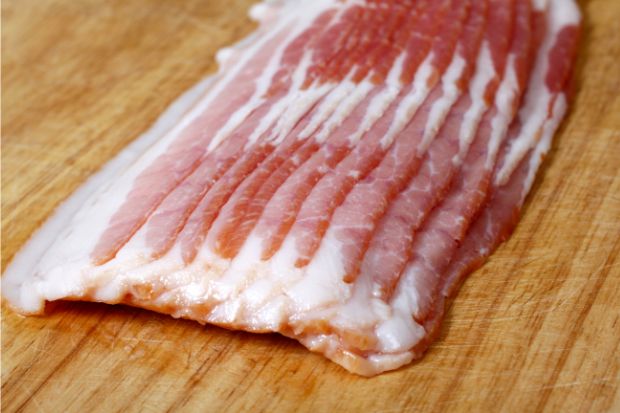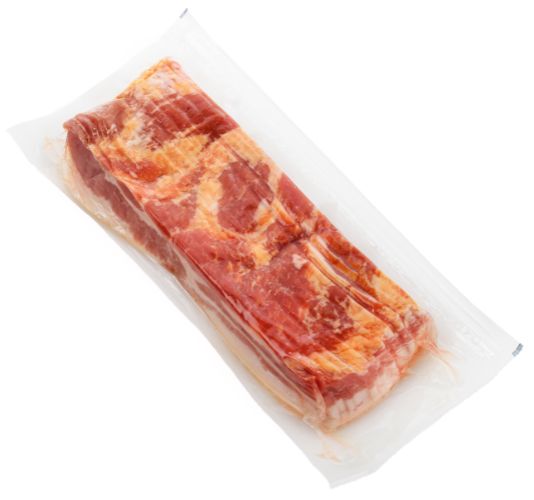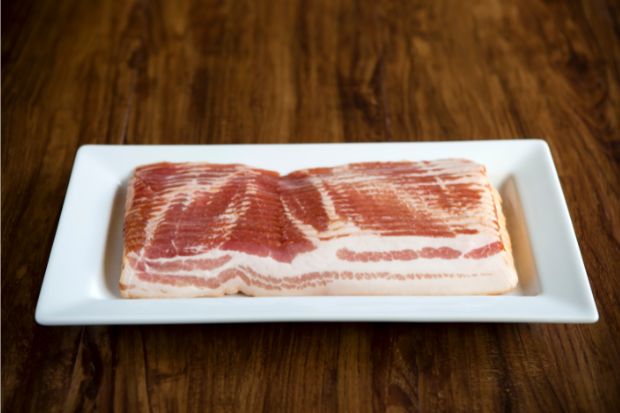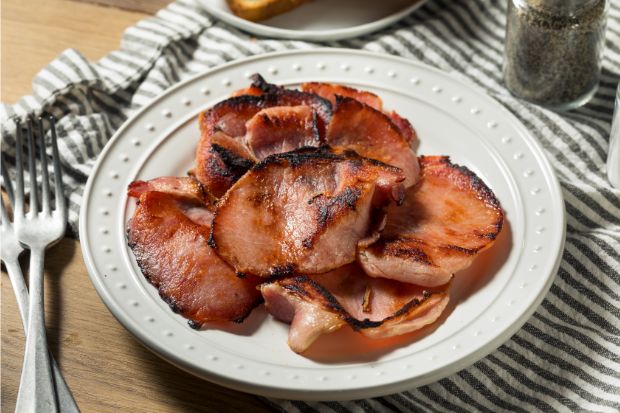Do you love the salty, crispy taste of bacon? If so, you’re not alone. It’s no secret that bacon is one of the most delicious and popular breakfast foods out there. In fact, Americans consume about 18 pounds of bacon per person each year!
But have you ever wondered why it’s so salty? As it turns out, there’s an excellent reason for bacon’s signature flavor. Salt is a natural preservative, and it helps prevent the growth of bacteria. This is especially important when it comes to curing meat, as bacon is typically made from pork belly. The high fat content of pork belly makes it particularly susceptible to spoilage, so the salt helps keep it fresh.
In addition to salt, bacon is also cured with sugar, which helps create its characteristic sweet-and-salty flavor. Today, we will explore the science behind why bacon is so salty and learn about the different types of bacon and how they are made. So let’s get started!

What Exactly Is Bacon?
According to the U.S. Department of Agriculture and Food Safety (USDA), bacon is a type of cured meat typically made from pork belly or the back of young animals, around 6 to 7 months old, that weigh up to 240 pounds.
The pork belly is trimmed and then soaked in a brine solution, sometimes for up to two weeks. The brine solution is a mixture of water, salt, and sometimes sugar. Some manufacturers also add spices and aromatics to the brine, such as rosemary, thyme, or garlic. After the pork belly has been cured, it’s then smoked, roasted, or cooked over a wooden fire. This gives bacon its signature flavor and texture.
When bacon is cured in a salt and water solution, it’s typically called “wet-cured.” Because the pork is soaked in the curing solution for an extended period of time, the resulting bacon often absorbs a significant amount of salt.
On the other hand, “dry-cured” bacon is cured with a salt rub, which is applied to the surface of the pork. This method doesn’t typically result in as salty of a taste because the meat doesn’t have as much time to absorb the salt.
Why Is Bacon Salty?

Because bacon is often cured in a salt and water solution, it’s quite salty and tasty. While some people seem to really enjoy it, others might find the taste to be a bit too strong. Additionally, bacon doesn’t serve some people well, especially when they’re trying to watch their sodium intake.
If this is a concern for you, it’s essential to look at bacon’s saltiness from different perspectives.
How Does Packaging Play a Role?
Bacon is one of the most popular breakfast foods available in every grocery store in the country. Because of its high demand, most stores often have it stacked up for their customers.
While this is excellent news for bacon lovers, it means that manufacturers must find a way to keep the bacon fresh for longer. And what better way to do this than by adding salt? Not only does the sodium help keep the bacon fresh, but it also adds flavor. This is why you’ll often find that “lower sodium” or “no added salt” bacon options are significantly less flavorful than their counterparts.

So if you’re looking for a more flavorful bacon option, you might have to sacrifice some of the health benefits. On the other hand, if you’re looking for a healthier option, it’s essential to check the packaging to see how much sodium has been added. Even “healthy” or “natural” bacon options can be high in salt content, so it’s essential to read the label before making your purchase.
How To Combat the Saltiness of Bacon
If you are looking to cut down on the saltiness of your bacon, there are a few things that you can do. First, make sure that you are using leaner cuts of bacon. The fat content in bacon can contribute to its salty taste, so by choosing leaner cuts, you can help to reduce some of that saltiness.
Secondly, you can cook your bacon in a way that reduces its saltiness. An effective method is to soak your bacon in water for 30 to 60 minutes before cooking it. This will help to draw out some of the salt from the bacon, making it a little healthier and more enjoyable to eat.

Finally, you can add other ingredients to your bacon to help offset the saltiness. This could include adding sweeteners like maple syrup or honey, as well as other savory flavors like garlic or onion. By doing this, you can create a more complex flavor that balances out the saltiness.
What Bacon Alternatives Have Less Salt?
If you can’t stand the high sodium levels in bacon strips, look for lower-salt options. These may include:
Uncured Bacon
This type of bacon is cured without sodium nitrites. So it may have almost the same amount of sodium as cured bacon but no added nitrates or nitrites. Uncured bacon is made from pork that has not been treated with preservatives and may be healthier overall. However, it’s still a good idea to check the sodium content on the package before purchasing it.
Turkey Bacon

Turkey bacon is a leaner alternative to pork bacon. It is made from ground turkey meat and typically has less fat and calories than pork bacon. Turkey bacon also tends to be lower in sodium than pork bacon. And it’s an excellent pork belly substitute. If you are looking for a healthier option, this might be the way to go.
Beef Bacon
Beef bacon is made from beef shoulder or brisket and is cured with a sugar and salt mixture. It has a deep flavor and is high in fat and calories. However, like turkey bacon, it is lower in sodium than pork bacon.
Lamb Bacon
Lamb bacon is made from lamb leg meat and cured with a sugar and salt mixture. It has a rich flavor and is high in fat and calories. However, it is also lower in sodium than pork bacon.
Vegetarian Bacon
There are many vegetarian bacon options available on the market. These are typically made from soy, wheat, or pea protein and are flavored to taste like bacon. While they may be lower in sodium than pork bacon, they are not necessarily healthier. Make sure to check the nutrition facts before purchasing.
Canadian Bacon

A leaner and less fatty option, Canadian bacon is also lower in salt than pork bacon. It is made from pig’s loin and is cured with a sugar and salt mixture. It’s also healthier than regular bacon.
Now You Know the Science Behind the Saltiness of Bacon
If you are looking for a healthier bacon option, be sure to check the sodium content on the package. If you are looking for a more flavorful option, you might have to sacrifice some of the health benefits.
The next time you enjoy a delicious slice of bacon, take a moment to appreciate its complex flavor profile and the science that went into making it!
